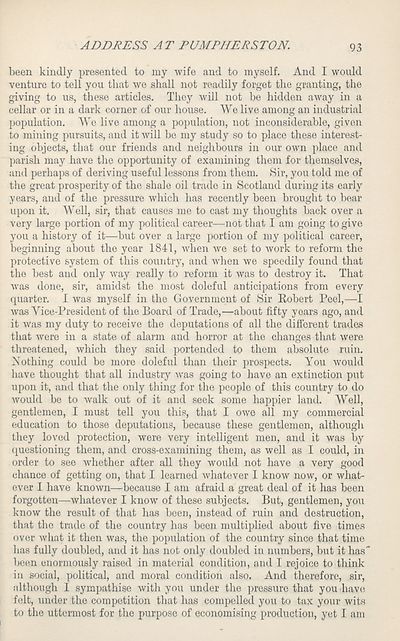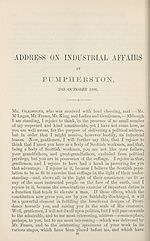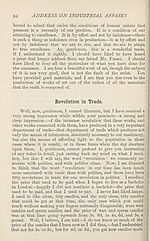Download files
Complete book:
Individual page:
Thumbnail gallery: Grid view | List view

ADDRESS AT PUMPHERSTON.
93
been kindly presented to my wife and to myself. And I would
venture to tell you that we shall not readily forget the granting, the
giving to us, these articles. They will not be hidden away in a
cellar or in a dark corner of our house. We live among an industrial
population. We live among a population, not inconsiderable, given
to mining pursuits, and it will be my study so to place these interest¬
ing objects, that our friends and neighbours in our own place and
parish may have the opportunity of examining them for themselves,
and perhaps of deriving useful lessons from them. Sir, you told me of
the great prosperity of the shale oil trade in Scotland during its early
years, and of the pressure which has recently been brought to bear
upon it. Well, sir, that causes me to cast my thoughts back over a
very large portion of my political career—not that I am going to give
you a history of it—but over a large portion of my political career,
beginning about the year 1841, when we set to work to reform the
protective system of this country, and when we speedily found that
the best and only way really to reform it was to destroy it. That
was done, sir, amidst the most doleful anticipations from every
quarter. I was myself in the Government of Sir Robert Peel,—I
was Vice-President of the Board of Trade,—about fifty years ago, and
it was my duty to receive the deputations of all the different trades
that were in a state of alarm and horror at the changes that were
threatened, which they said portended to them absolute ruin.
Nothing could be more doleful than their prospects. You would
have thought that all industry -was going to have an extinction put
upon it, and that the only thing for the people of this country to do
would be to walk out of it and seek some happier land. Well,
gentlemen, I must tell you this, that I owe all my commercial
education to those deputations, because these gentlemen, although
they loved protection, were very intelligent men, and it was by
questioning them, and cross-examining them, as well as I could, in
order to see whether after all they would not have a very good
chance of getting on, that I learned whatever I know now, or what¬
ever I have known—because I am afraid a great deal of it has been
forgotten—whatever I know of these subjects. But, gentlemen, you
know the result of that has been, instead of ruin and destruction,
that the trade of the country has been multiplied about five times
over what it then was, the population of the country since that time
has fully doubled, and it has not only doubled in numbers, but it has'
been enormously raised in material condition, and I rejoice to think
in social, political, and moral condition also. And therefore, sir,
although I sympathise with you under the pressure that you have
felt, under the competition that has compelled you to tax your wits
to the uttermost for the purpose of economising production, yet I am
93
been kindly presented to my wife and to myself. And I would
venture to tell you that we shall not readily forget the granting, the
giving to us, these articles. They will not be hidden away in a
cellar or in a dark corner of our house. We live among an industrial
population. We live among a population, not inconsiderable, given
to mining pursuits, and it will be my study so to place these interest¬
ing objects, that our friends and neighbours in our own place and
parish may have the opportunity of examining them for themselves,
and perhaps of deriving useful lessons from them. Sir, you told me of
the great prosperity of the shale oil trade in Scotland during its early
years, and of the pressure which has recently been brought to bear
upon it. Well, sir, that causes me to cast my thoughts back over a
very large portion of my political career—not that I am going to give
you a history of it—but over a large portion of my political career,
beginning about the year 1841, when we set to work to reform the
protective system of this country, and when we speedily found that
the best and only way really to reform it was to destroy it. That
was done, sir, amidst the most doleful anticipations from every
quarter. I was myself in the Government of Sir Robert Peel,—I
was Vice-President of the Board of Trade,—about fifty years ago, and
it was my duty to receive the deputations of all the different trades
that were in a state of alarm and horror at the changes that were
threatened, which they said portended to them absolute ruin.
Nothing could be more doleful than their prospects. You would
have thought that all industry -was going to have an extinction put
upon it, and that the only thing for the people of this country to do
would be to walk out of it and seek some happier land. Well,
gentlemen, I must tell you this, that I owe all my commercial
education to those deputations, because these gentlemen, although
they loved protection, were very intelligent men, and it was by
questioning them, and cross-examining them, as well as I could, in
order to see whether after all they would not have a very good
chance of getting on, that I learned whatever I know now, or what¬
ever I have known—because I am afraid a great deal of it has been
forgotten—whatever I know of these subjects. But, gentlemen, you
know the result of that has been, instead of ruin and destruction,
that the trade of the country has been multiplied about five times
over what it then was, the population of the country since that time
has fully doubled, and it has not only doubled in numbers, but it has'
been enormously raised in material condition, and I rejoice to think
in social, political, and moral condition also. And therefore, sir,
although I sympathise with you under the pressure that you have
felt, under the competition that has compelled you to tax your wits
to the uttermost for the purpose of economising production, yet I am
Set display mode to:
![]() Universal Viewer |
Universal Viewer | ![]() Mirador |
Large image | Transcription
Mirador |
Large image | Transcription
| Antiquarian books of Scotland > Politics & government > Political speeches in Scotland in 1890 > (97) |
|---|
| Permanent URL | https://digital.nls.uk/126569454 |
|---|
| Description | Thousands of printed books from the Antiquarian Books of Scotland collection which dates from 1641 to the 1980s. The collection consists of 14,800 books which were published in Scotland or have a Scottish connection, e.g. through the author, printer or owner. Subjects covered include sport, education, diseases, adventure, occupations, Jacobites, politics and religion. Among the 29 languages represented are English, Gaelic, Italian, French, Russian and Swedish. |
|---|

